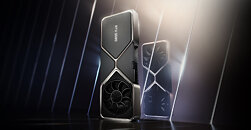Raevenlord
News Editor
- Joined
- Aug 12, 2016
- Messages
- 3,755 (1.22/day)
- Location
- Portugal
| System Name | The Ryzening |
|---|---|
| Processor | AMD Ryzen 9 5900X |
| Motherboard | MSI X570 MAG TOMAHAWK |
| Cooling | Lian Li Galahad 360mm AIO |
| Memory | 32 GB G.Skill Trident Z F4-3733 (4x 8 GB) |
| Video Card(s) | Gigabyte RTX 3070 Ti |
| Storage | Boot: Transcend MTE220S 2TB, Kintson A2000 1TB, Seagate Firewolf Pro 14 TB |
| Display(s) | Acer Nitro VG270UP (1440p 144 Hz IPS) |
| Case | Lian Li O11DX Dynamic White |
| Audio Device(s) | iFi Audio Zen DAC |
| Power Supply | Seasonic Focus+ 750 W |
| Mouse | Cooler Master Masterkeys Lite L |
| Keyboard | Cooler Master Masterkeys Lite L |
| Software | Windows 10 x64 |
A number of RTX 3080 users have been reporting crashes to desktop while gaming on their newly-acquired Ampere graphics cards. The reports have surged in numerous hardware discussion venues (ComputerBase, LinusTechTips, NVIDIA, Tom's Hardware, Tweakers and Reddit), and appear to be unlinked to any particular RTX 3080 vendor (ZOTAC, MSI, EVGA, and NVIDIA Founders Edition graphics cards are all mentioned).
Apparently, this crash to desktop happens once the RTX 3080's Boost clock exceeds 2.0 GHz. A number of causes could be advanced for these issues: deficient power delivery, GPU temperature failsafes, or even a simple driver-level problem (though that one seems to be the least likely). Nor NVIDIA nor any of its AIB partners have spoken about this issue, and review outlets failed to mention this happening - likely because it never did, at least on samples sent to reviewers. For now, it seems that manually downclocking the graphics card by 50-100 MHz could be a temporary fix for the issue while it's being troubleshooted. An unlucky turn of events for users of NVIDIA's latest and greatest, but surely it's better to face a very slight performance decrease in exchange for system stability.

View at TechPowerUp Main Site
Apparently, this crash to desktop happens once the RTX 3080's Boost clock exceeds 2.0 GHz. A number of causes could be advanced for these issues: deficient power delivery, GPU temperature failsafes, or even a simple driver-level problem (though that one seems to be the least likely). Nor NVIDIA nor any of its AIB partners have spoken about this issue, and review outlets failed to mention this happening - likely because it never did, at least on samples sent to reviewers. For now, it seems that manually downclocking the graphics card by 50-100 MHz could be a temporary fix for the issue while it's being troubleshooted. An unlucky turn of events for users of NVIDIA's latest and greatest, but surely it's better to face a very slight performance decrease in exchange for system stability.

View at TechPowerUp Main Site






 ) but what I said has relevance about whats been discussed in this thread too:
) but what I said has relevance about whats been discussed in this thread too: